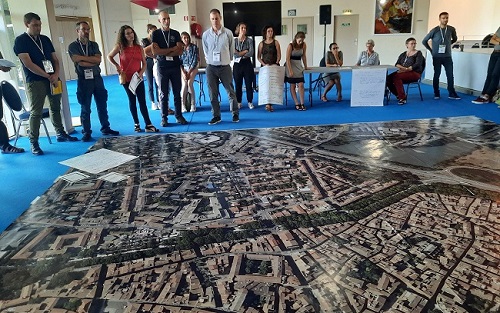
Thinking about transitions requires a global and systemic approach in order to grasp the challenges and medium- and long-term changes, and to identify and prioritise the actions to be taken. Involving a range of stakeholders strengthens the coherence of the analysis, helps to develop cooperation and provides a link in a context of change and strategic choices to be made at local level.
Many local authorities may feel helpless in the face of these challenges, but in reality a great deal is already happening, and there are tools available to help build local momentum.
The forum held on 5 and 6 December, entitled "Impulser les transitions dans nos territoires - Des outils & méthodes pour accélérer! "was organised by Platform 21 and the ERASME Centre for Sustainable Development/University of Clermont Auvergne, in partnership with the Ministry for Ecological Transition and Territorial Cohesion, Comète, the DREAL Auvergne-Rhône-Alpes, the Puy-de-Dôme Departmental Council, ADEME, the RARE Network, Cerema, France Urbaine, the Fabrique des Transitions, Comb Lab, AMORCE and with the support of the CNFPT.
Transition requires cooperation and a 360° approach
 Opening the forum, Elsa Delcombel, Deputy Director of the Territorial Transitions Department at Cerema Centre-Est, and Anne-Louise Nègre, Head of the Resources Unit at the Association de promotion de la Fabrique des transitions, reminded participants that taking into account interdependencies, chain effects, the functioning of ecosystems and environmental and social issues requires complex thinking.
Opening the forum, Elsa Delcombel, Deputy Director of the Territorial Transitions Department at Cerema Centre-Est, and Anne-Louise Nègre, Head of the Resources Unit at the Association de promotion de la Fabrique des transitions, reminded participants that taking into account interdependencies, chain effects, the functioning of ecosystems and environmental and social issues requires complex thinking.
This complexity does not mean that we have to set our sights high in all areas immediately: the challenge is to start on a small scale and expand, developing actions around a specific issue, through 360° questioning and a broader vision of the subject. "What's important is the way we look at things and the way we link them together, rather than a miracle recipe".
To illustrate her point, Elsa Delcombel presented two examples of initiatives carried out by Cerema, in which a specific issue was examined from a broader angle to provide a better response to the challenges of the energy and ecological transition: a heritage approach to local authority buildings in the context of energy renovation, in which the comfort of occupants, accessibility and ageing were all considered as part of a multi-issue diagnosis; the other example was that of a comprehensive approach to adapting the Nièvre département to climate change, based on an initial request relating solely to agriculture.
The speakers also emphasised the importance of allowing time for learning, experimentation and observation, so as to gradually build up skills, but also to develop cooperation.
"Cooperation is a way of acting together despite disagreements - we can't be in line all the time! - and tries to overcome them".
Lastly, Anne-Louise Nègre and Elsa Delcombel emphasised the role of organisations in the transition, by changing their own attitudes and practices: it's not just a question of getting departments to cross paths from time to time, but of organising forums or other events in "cooperation" mode, with changes in attitude on the part of the various experts, who are then put on the same level.
The transition as seen in the regions
 The conference continued with a round-table discussion designed to give the floor to public and private players from the regions to talk about modes of cooperation, cross-disciplinary approaches to transition, changes in their practices, and the motivations behind the transition initiatives they have undertaken. Among the points highlighted during the seminar discussions were:
The conference continued with a round-table discussion designed to give the floor to public and private players from the regions to talk about modes of cooperation, cross-disciplinary approaches to transition, changes in their practices, and the motivations behind the transition initiatives they have undertaken. Among the points highlighted during the seminar discussions were:
- The importance of working as part of a network to share questions and feedback
- The need to define a shared vision for the future of the region
- The need to build a solid, long-term vision on which local authority departments can draw
- Preserving resources and anticipating their future
- Use nature-based solutions
- Design public policy evaluation systems that incorporate a cross-disciplinary approach
- Take account of the irrationality of people's positions, and look to reality for ways of resolving situations
- Realising that people learn through action and when they enjoy it: it is above all their emotions and experiences that motivate them to act, not their knowledge.
12 tools for reflection and action
Twelve tools were then presented and explored in rotating workshops. Most of these tools were designed to stimulate and nurture discussion about transitions and initiate cooperation. The proceedings present feedback on the workshops, their strengths and limitations in use, materials and useful contacts (all of which are in the conference proceedings):
Tools to help you assess your actions (strengths/weaknesses), revealing the areas in which you need to improve:
- La fiche action de la The Agenda 2030 toolbox action sheet
- La The self-evaluation grid for assessing the environmental impact of actions
- Les Social circles
- Le The antidote kit and its complementary tools
Tools based on databases, for static or dynamic mapping of the current situation, and for testing scenarios;
Tools for questioning and orienting your project, leading discussions
- 360° vision
- La The resilience compass
- E-sherpa (energy renovation of buildings)
- Le référentiel The Territoire Engagé pour la Transition Écologique (Territory Committed to Ecological Transition) reference system
Management tools, applied to accounting.
- Climate assessment of budgets
- CARE accounting (Comprehensive Accounting in Respect of Ecology)
Contact
DELCOMBEL Elsa, Deputy Director Teritorial Transitions Department, Cerema Centre-Est - 04 74 27 51 27

